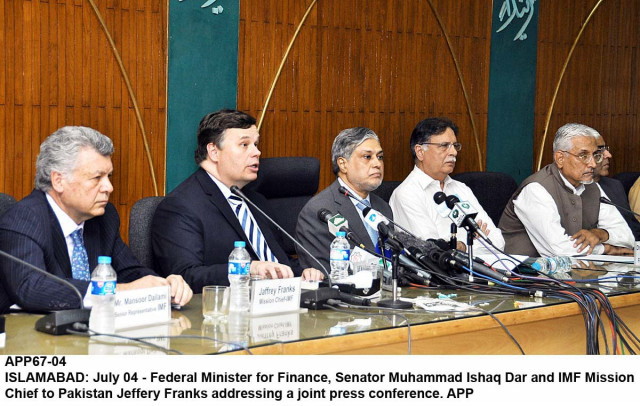An opportunity and a risk
We sincerely hope Finance Minister Ishaq Dar impose the growth-oriented vision he promised in his budget speech.

Finance Minister Ishaq Dar along with IMF mission chief Jeffery Franks addressing the joint press conference about Pakistan's IMF loan deal. PHOTO: APP
Firstly, let us not delude ourselves into forgetting what this IMF programme really is: it is the bailout that will help Pakistan pay back the last bailout that the country took from the same lender because the previous administration was too preoccupied with political scandal to be able to put the nation’s house in order. An IMF bailout is supposed to offer governments temporary breathing room from the lender of last resort while they put their fiscal house in order. In Pakistan, the finance ministry appears to look upon the IMF as a permanent source of funding, and, in some senses, relies more on the Washington-based lender than on the Pakistani taxpayer.
That being said, there are some merits of the programme, and we hope the government will utilise this opportunity, particularly since the IMF appears to have come up with conditions that should be easier for the centre-right PML-N to follow through on than its predecessors, the centre-left PPP.
For starters, the IMF has been somewhat more flexible on the politically unpopular subject of raising electricity tariffs as a means of cutting the government’s energy subsidy bill and instead, has asked the government to focus on privatisation of state-owned power companies. The PML-N has historically been the most pro-privatisation party in Pakistan’s political spectrum and its relations with the country’s business and investor community makes this an easier sell. On this score, we do not expect much trouble and hope that the PML-N proceeds to fulfil its campaign promises.
The part of the package that will require the most prudence by the finance ministry is the requirement to cut the budget deficit from an appalling 8.3 per cent of the total size of the economy to six per cent of gross domestic product. The IMF has not specified where the cuts should come from. Historically, the bureaucrats at the finance ministry are more than happy to cut back on the development budget because they seem to view it as the most dispensable part of the government’s spending outlay. Nothing could be further from the truth. If cuts must come, they must be found in the tremendously wasteful subsidy bill, as well as the portion of the budget used to bail out state-owned enterprises year after year.
It makes no sense for a nation currently on the verge of reaping the rewards of a demographic dividend, and with a population so young, to spend money on current consumption rather than investing in future growth. Cutting development for the sake of subsidies is tantamount to robbing the nation’s children and youth to pay for the lifestyles of Pakistan’s middle-aged upper-middle and upper classes. We sincerely hope that Finance Minister Ishaq Dar will avoid taking the inevitable advice from the bureaucrats who work for him and impose the growth-oriented vision that he promised in his budget speech last month.
Finally, there are the portions of the bailout agreement that the government has probably been unwise to agree to, especially the one that requires the federal government to pressure the provincial governments to reduce their spending and run artificial surpluses. This is asking for political trouble, considering the fact that two out of the four provinces in the country are run by rivals of the ruling PML-N.
But beyond that, it is an unconscionable violation of the principles of federalism, which were reaffirmed once again in 2010 with the passage of the Eighteenth Amendment to the Constitution and the National Finance Commission Award. The PML-N has shown great maturity so far in dealing with its political rivals. Now would be a bad time to go back on that fine tradition.
Published in The Express Tribune, July 7th, 2013.
Like Opinion & Editorial on Facebook, follow @ETOpEd on Twitter to receive all updates on all our daily pieces.


















COMMENTS
Comments are moderated and generally will be posted if they are on-topic and not abusive.
For more information, please see our Comments FAQ